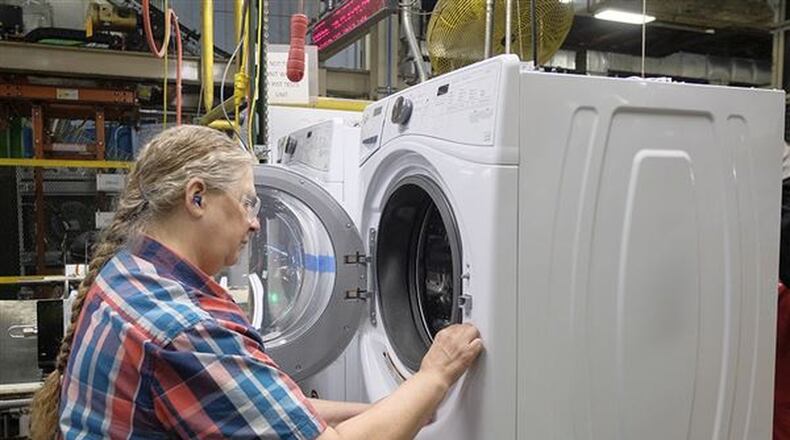Now, in the aftermath of the Trump administration’s May 31 announcement that it would slap tariffs of 25 percent on steel and 10 percent on aluminum from Canada, Canadian Prime Minister Justin Trudeau has vowed to strike back hard. Almost immediately, Canada released its own list of retaliatory tariffs, and not just on steel and aluminum. Also included were household products ranging from shaving cream to toilet paper to inflatable boats. The tariffs are set to go into effect July 1.
The impact on Ohio is a reflection of what gets made here, and it’s not a small list. Consider this:
- Yogurt? Dannon, in Minster, makes it.
- Strawberry jam? Smuckers, pride of Orrville, manufactures it.
- Shaving cream? The Barbasol brand is made in Ashland.
- Parts for washers and dryers? Whirlpool, with locations in Ottowa, Greenville and Clyde.
- Cars? Hondas are made in Marysville, and Chevy Cruzes in Lordstown.
Despite the possible impact, many of the companies have been guarded in their reactions. For example, here is the statement Honda released: “While we anticipate that the tariffs will impact Honda’s operations and business partners, we are still in the process of accessing the specific impacts as well as possible strategies to mitigate any adverse effects on our customers, associates, suppliers and dealers,” the company wrote.
For decades, the prospect of a trade war with Canada has been an idea about as likely as a unicorn invasion. The two countries are close allies.
But the high-wire debate over the renegotiation of NAFTA — as well as President Donald Trump’s oft-repeated concerns about the U.S. steel industry — has ignited some unlikely tensions. The spat has gotten heated enough that Trump — during a May 25 call with Trudeau — reportedly quipped that the tariffs were a national security issue because Canada burned down the White House during the War of 1812. (It was actually British troops.)
When he first announced the tariffs in March, Trump exempted U.S. allies including Canada, Mexico and the European Union. He lifted those exemptions on May 31 — an action which has provoked a waterfall of retaliatory actions from all three. While Canada is by far the leading trading partner, the other two do significant trade with Ohio as well.
Ohio’s senators say they don’t mind tariffs but want them pointed at countries that have dumped underpriced steel onto the U.S. market.
“I think Canada should be exempted from the steel tariffs,” said Sen. Rob Portman, an Ohio Republican who supports renegotiating NAFTA. “The real problem is China. It’s not Canada.”
Sen. Sherrod Brown, D–Ohio, supports tariffs on China and other nations that undercut U.S. steel producers as a means for leveling the playing field. But, he said, aiming the tariffs at Canada “does not do that.”
Ohio’s economy is tightly integrated with Canada’s, with auto parts from Canada and Mexico helping to create Hondas and Chevrolets produced in the state. Consumers would likely see the impact in higher prices — the price of auto parts, for example, would have to increase to accommodate the tariffs — and businesses would see the impact in pressure on their bottom line. Some businesses, hoping to avoid sticker shock for their consumers, have already begun increasing prices in expectations of the tariffs, according to Ned Hill, a professor at the Ohio State University who teaches economic development policy.
Tim Burga, president of the Ohio AFL-CIO, said his union appreciates “the concept of trying to balance the playing field,” but added: “the way in which the president has gone about this….is seemingly not terribly well thought out.”
Both Burga and Eric Burkland, president of the Ohio Manufacturers Association, are hoping Trump is using the tariffs as a bargaining chip and will pull back before Canada imposes an additional tax on American goods.
“We don’t want to end up in a trade war with one of our closest allies,” said Burkland.
Rob Scott, director of trade and manufacturing policy research at the left-leaning Economic Policy Institute, said Canada should have stood behind the U.S. in its effort to punish China for cheating.
“They had the choice to work with us to develop tougher policies for unfair trade by China or the choice to pick a fight with us,” he said. “They chose the latter.”
Still, Scott is critical of Trump’s approach to trade, saying the president has focused too much on spats with individual countries than on a global approach that could unite allies against China.
Former Rep. Pat Tiberi, who heads the Ohio Business Roundtable, said the real hit on consumers will occur if the U.S. expands its tariffs on Canada beyond just aluminum and steel. But even if the tariff threat is only a negotiating tool, it can be harmful, he said.
“The problem is it creates a ton of uncertainty and uncertainty slows down the economy,” Tiberi said, “It’s a very, very dangerous game.”
Ian Sheldon, a professor and Andersons Chair of Agricultural Marketing, Trade and Policy at Ohio State University, said the policy may indicate the end of the U.S. taking the lead in the global trade system.
“This is just blowing up trade system in my view,” he said. “The U.S. trade deficit is definitely not solved by this.”
About the Author
